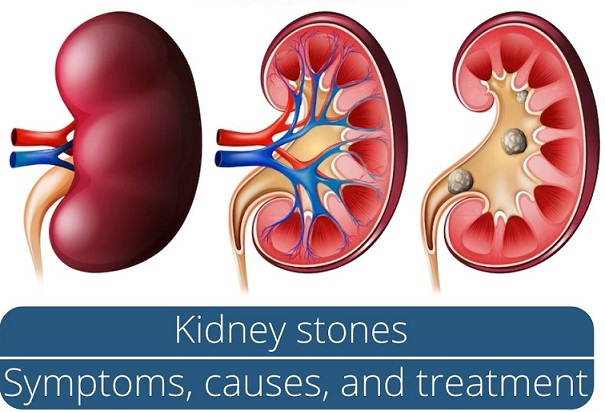- 20-Mar-23
Kidney stones are hard crystals made of minerals and salts that develop inside your kidneys. They are also referred to as nephrolithiasis, kidney calculi, or urolithiasis.
Kidney stones can be caused by a variety of factors including diet, excess body weight, some medical conditions, specific supplements, and medicines. Any portion of your urinary tract from your kidneys to your bladder can be impacted by kidney stones. When pee becomes concentrated, minerals can crystallize and adhere to one another and frequently lead to stones.
Kidney Stone Meaning in Urdu:
گردے کی پتھری - ایک انتہائی تکلیف دہ بیماری ہے جو گردوں میں معدنی اور نمک کے جمع ہونے سے ہوتی ہے۔ جب ایسا ہوتا ہے تو، پتھری پیشاب کی نالی کے کسی بھی حصے میں بن سکتی ہے۔ گردے کی پتھری کی کچھ عام وجوہات میں غیر متوازن غذا کھانا، وزن زیادہ ہونا، اور بعض دوائیں اور سپلیمنٹس لینا شامل ہیں۔ گردے کی پتھری مثانے کو بھی متاثر کر سکتی ہے۔
Types of Kidney Stones:
Kidney stones can be classified into four categories:
- Calcium stones: These are the most common type of kidney stone and are formed from calcium oxalate. They can also be formed from calcium phosphate.
- Struvite stones: These stones are made up of magnesium, ammonium and phosphate. They often form as a result of urinary tract infections.
- Uric acid stones: These stones are formed from uric acid which is a waste product that is normally excreted in urine. They can form when urine is too acidic.
- Cystine stones: These stones are rare and are formed from a genetic disorder called cystinuria. People with this disorder have a problem with the way their body processes certain amino acids which leads to the formation of cystine stones.
Kidney Stones Symptoms:
Depending on the size and position of the stone, the symptoms of kidney stones can change. Some typical signs include:
- Severe back, side, or lower abdominal discomfort.
- Pain that comes and goes in waves.
- Painful urination.
- Pink, red, or brown urine.
- Cloudy or foul-smelling urine.
- Nausea and vomiting.
- Frequent urination.
- Difficulty urinating.
- Shivers and a fever (if an infection is present).
- Blood in the urine.
For a precise diagnosis and the best course of therapy, it's crucial to see a healthcare provider at IMC Hospital if you experience any of these symptoms.
Kidney Stones Treatment:
The treatment for kidney stones depends on the size, type, and location of the stone as well as the severity of symptoms. Some common treatments include:
- Pain management: Pain medication such as ibuprofen, acetaminophen, or opioids may be prescribed to manage pain.
- Drinking water: Drinking plenty of water and fluids can help flush out the stone.
- Medications to help pass the stone: Medications such as alpha blockers can help relax the muscles in the ureter, making it easier for the stone to pass.
- Extracorporeal shock wave lithotripsy (ESWL): This is a non-invasive procedure that uses shock waves to break up the stone into smaller pieces that can pass through the urinary tract.
- Ureteroscopy: This is a minimally invasive procedure that uses a small scope to remove the stone from the ureter.
- Percutaneous nephrolithotomy (PCNL): This is a surgical procedure that involves making a small incision in the back to remove the stone.
- Preventive measures: To prevent future kidney stones, your healthcare provider may recommend dietary changes, medications, or other preventive measures.
Seek immediate medical care if you have severe pain in the back, blood in the urine, difficulty urinating, nausea and vomiting and fever and chills, or if you have other serious symptoms.
Kidney Specialist in Lahore:
IMC Hospital is one of the most prestigious institutions in Pakistan which is known for its performance and outstanding results regarding Nephrology & Dialysis. Here you find one of the Best Nephrology (Kidney Diseases) specialists in Lahore Pakistan. Visit Integrated Medical Care Hospital and book your appointment at (IMC Hospital).
Prof. Dr. Shafiq Cheema
MD, MBBS, Diplomat American Board of Internal Medicine (DABIM), DABN, FACP, FASN
Specialties - Internal Medicine, Nephrology (Kidney Diseases).
Areas of Focus - Kidney Diseases, Hypertension, Kidney Transplantation, Dialysis, Kidney Stones, Proteinuria, Hematuria, and Diabetes.

 Map
Map










